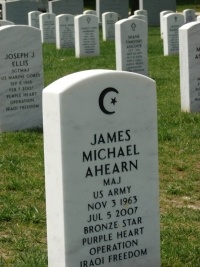c. 2008 Religion News Service
ARLINGTON, Va. _ There seems to be a striking symmetry on the rolling green hills of Arlington National Cemetery _ rows upon rows of identical white limestone markers, perfectly spaced in every direction.
But underground, Muslims are laid to rest on their right side, facing Mecca, according to custom.
A Jewish Marine, meanwhile, might be buried in a traditional wooden coffin with wooden nails, which can be quickly absorbed into the earth according to Jewish tradition.
For the families of Jewish and Muslim members of the armed forces, challenges often arise when religious tradition conflicts with explicit rules that govern U.S. military cemeteries. Sometimes, an individual or family must choose one over the other.
For example, Muslims and Jews generally are not buried alongside members of other faiths. At military cemeteries, however, servicemen are not segregated by religion.
But a desire to be buried with their units sometimes trumps religious tradition. Many Jews are regularly buried in places like Arlington. Observant Jews, however, “would tend not to be buried there,” said Col. Ira Kronenberg, an Orthodox rabbi and chairman of the military chaplains’ committee of the Rabbinical Council of America.
Abdul-Rashid Abdullah, deputy director of the American Muslim Armed Forces and Veterans Affairs Council, said the desire to demonstrate patriotism _ especially in a post-Sept. 11 world _ is a leading reason Muslim service members choose to be buried in Arlington.
This way, Abdullah said, a family makes an important final statement with their loved one’s final resting place, as if to say, “Hey, we are patriotic people, our child served this country.”
Abdullah, who is a veteran, understands the desire of a soldier to be buried with his or her unit. Still, he said, “I wouldn’t want to be buried there myself. This is not a proper Muslim cemetery.“
The two faiths share other requirements. Both Islam and Judaism take seriously the need for a body to be laid to rest quickly.
“A person’s body is made in the image of God,” said Kronenberg. “The body must be treated in an extremely dignified manner. … Burial must take place as soon as possible. A body is supposed to decompose into the earth, dust to dust.”
Islam has similar laws. Abdullah said the religious goal is “to bury it within a 24-hour period. … If you die in the morning, it should be buried in the afternoon before sunset.“
In World War II, servicemen who died overseas were buried in Europe and elsewhere, but today’s service members are brought home for burial, which can make the two religions’ speedy burial tradition difficult to accomplish.
However, the military makes special accommodations to get the body to rest in American soil as soon as possible.
If a soldier dies close to a military base, the body can be transported from anywhere in the world to Delaware’s Dover Air Force Base in a little more than 24 hours, Kronenberg said.
“They go out of their way to treat the dead with the utmost respect,” he said.
In Iraq, sandstorms or lack of access to helicopters or other military vehicles could extend the wait for days. But the military moves so quickly and efficiently that a fallen comrade could receive full military honors, with an escort platoon and military band, immediately upon arriving home.
“If they get a call, (the honor guard) can be ready at a moment’s notice,” Kronenberg said. “Unfortunately, the military has had to do too may full honor funerals in the last five years,” he added.
Another factor comes from military law that mandates a “forensic pathology investigation,” or autopsy, is justified whenever a service member dies in an “unnatural” way, including being killed in combat.
Judaism and Islam strongly frown on autopsies for two main reasons: First, they prolong the time until a body is buried; and second, they are considered mutilation of the body and are therefore undignified.
“If you watch `CSI’ and shows like this, there are a lot of gallows humor” during autopsies, Kronenberg said. If an autopsy had to be done, both Judaism and Islam would require an imam or rabbi to be present to ensure the procedure is done with care.
To comply with the Army mandate and still respect their religious traditions, some Muslim and Jewish groups are pushing for what is called a “virtual” autopsy. It involves using non-invasive methods like CT scans and MRIs to create a 3D scan that can be enlarged, rotated and, best of all, saved digitally.
“There are so many things that are shared between Muslims and Jews in regard to traditions. It behooves everyone to work together,” Abdullah said.
KRE/CM END RUBIN
A photo of an Islamic headstone at Arlington is available via https://religionnews.com.





